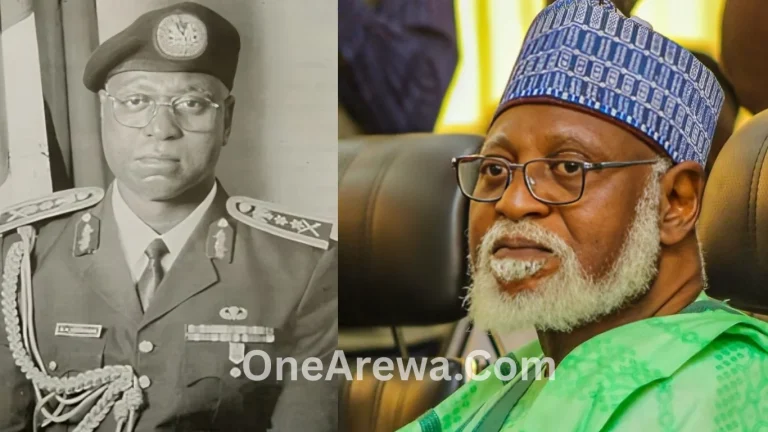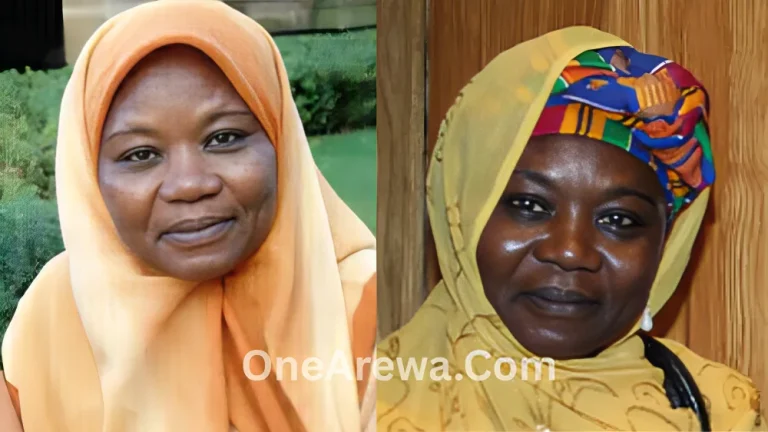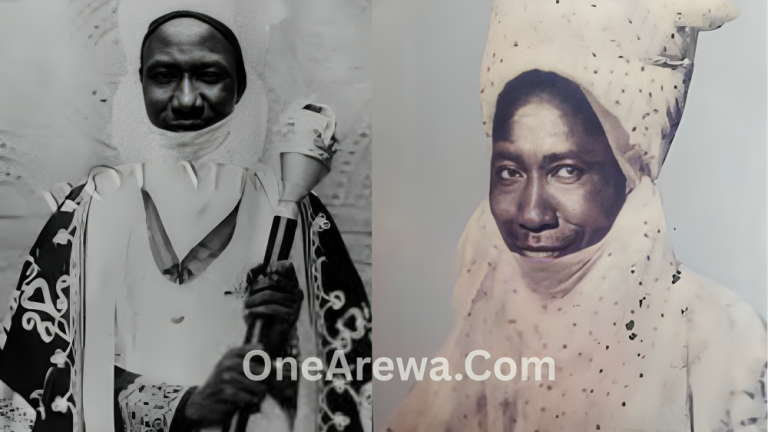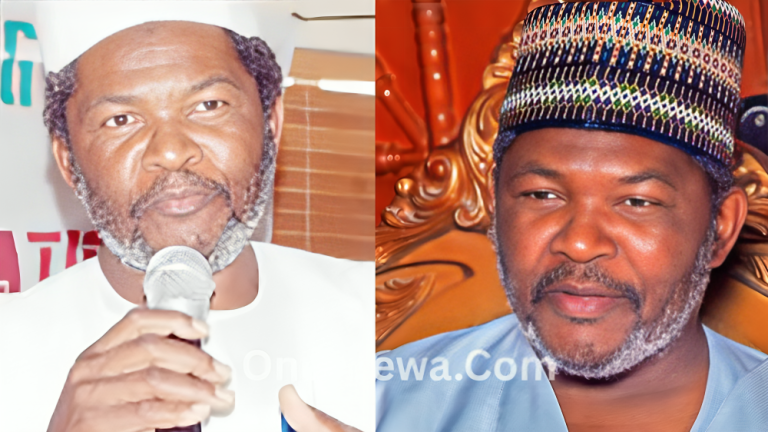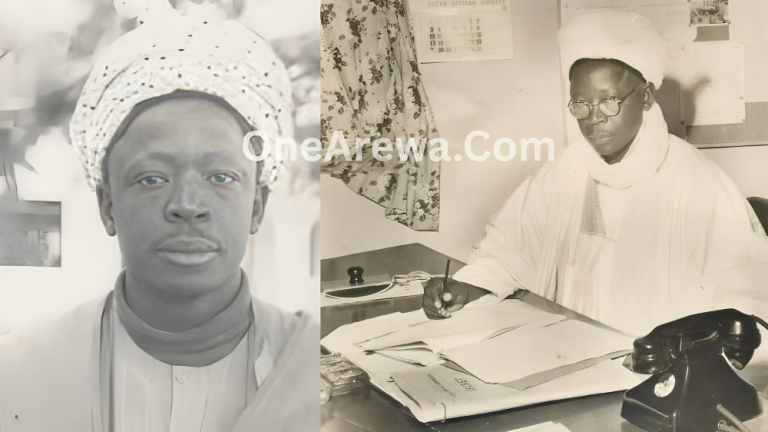Sir Ahmadu Bello GCON KBE: The Sardauna of Sokoto and Architect of Northern Nigeria’s Modern Identity
Sir Ahmadu Bello GCON KBE
Sir Ahmadu Bello, popularly known as the Sardauna of Sokotoborn on June 12, 1910, and died on January 15, 1966.
Sir Ahmadu Bello, often known as the Sardauna of Sokoto, was a conservative Nigerian statesman and one of the most influential northern political figures during Nigeria’s early independence.
He was the first and only Premier of the Northern Region from 1954 until his assassination in 1966, during which time he wielded considerable power in national affairs.
He led the Northern People’s Congress (NPC), the ruling party at the time, which was primarily made up of Hausa-Fulani elites.
Before his political career, he was elected to the regional assembly and later became a government minister.
Ahmadu Bello, a direct descendant of the Sokoto Caliphate family, once sought to be Sultan of Sokoto, but after an unsuccessful quest, he devoted his life to politics.
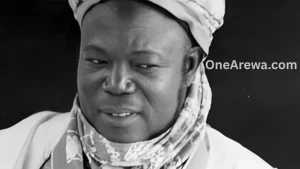
Sir Ahmadu Bello GCON KBE: Wikipedia
| Category | Details |
|---|---|
| Full Name | Alhaji Sir Ahmadu Bello |
| Titles | Sardauna of Sokoto, GCON, KBE |
| Date of Birth | June 12, 1910 |
| Place of Birth | Rabbah, Sokoto State, Nigeria |
| Date of Death | January 15, 1966 |
| Ethnicity | Fulani |
| Religion | Islam |
| Education | – Traditional Islamic education |
| – Sokoto Middle School | |
| – Katsina Teacher’s Training College | |
| – Local Government Studies in England (1948) | |
| Political Roles | – First Premier of Northern Nigeria (1954–1966) |
| – President of the Northern People’s Congress (NPC) | |
| – Key leader in Nigeria’s independence movement | |
| – Declined the position of Prime Minister to stay in the North | |
| Major Achievements | – Founded Ahmadu Bello University, Zaria (1962) |
| – Established NNDC, Bank of the North, BCNN, and Nigeria Citizen Newspaper | |
| – Promoted unity and modernization of Northern Nigeria | |
| – Advocated federalism and regional development | |
| Honours | – Knighted by Queen Elizabeth II (KBE) |
| – Grand Commander of the Order of the Niger (GCON) | |
| – Honorary Doctorate from the University of Nigeria, Nsukka (1961) | |
| Legacy | – Featured on Nigeria’s ₦200 note |
| – Seen as one of Nigeria’s most influential founding fathers | |
| – Assassinated during the January 15, 1966, military coup |
Sir Ahmadu Bello GCON KBE: Early Life and Education
Ahmadu Bello was born about 1910 in Rabah, present-day Sokoto State, into the royal family of Mallam Ibrahim Atiku Bello, the Sarkin of Rabah at the time.
He was a direct descendant of Shehu Usman ɗan Fodio, the founder of the Sokoto Caliphate, as he was a great-grandson of Sultan Muhammad Bello and a grandson of Sultan Atiku na Raba.
He obtained his early education at home, where he learned about the Qur’an, Islamic law (fiqh), and the Prophet Muhammad’s traditions.
He later attended Sokoto Provincial School and Katsina Training College (now known as Barewa College).
During his school years, he was widely known as Ahmadu Rabah and affectionately referred to as Gamji by his classmates.
Bello began teaching English at the Sokoto Middle School after graduating in 1931.
Sir Ahmadu Bello GCON KBE: Traditional Roles and Early Leadership
Sultan Hassan dan Mu’azu named him as the District Head of Rabah in 1934, succeeding his brother.
Four years later, in 1938, he was promoted to Divisional Head of Gusau (now in Zamfara State) and appointed to the Sultan’s Council.
At the age of 28, he attempted an ambitious bid to become Sultan of Sokoto, but was defeated by Sir Siddiq Abubakar III, who would govern for five decades, from 1938 to 1988.
Despite his defeat, Sultan Abubakar III bestowed upon him the prestigious title of Sardauna of Sokoto (Crown Prince) and appointed him to the Sokoto Native Authority Council, thereby making him the Sultan’s Chief Political Adviser.
Later, he was appointed to administer all 47 districts of Sokoto Province. By 1944, he had returned to the Sultan’s Palace and been appointed Chief Secretary of the State Native Administration.
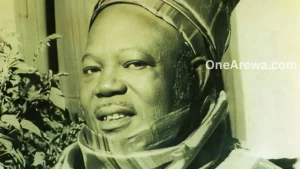
Sir Ahmadu Bello GCON KBE: Political Journey and Legacy
Sir Ahmadu Bello joined the Jam’iyyar Mutanen Arewa in the 1940s, which later changed its name to the Northern People’s Congress (NPC) in 1951.
In 1948, he went to England on a government scholarship to study Local Government Administration.
This encounter considerably increased his knowledge of governance.
Young Politician:
Bello was nominated to represent Sokoto Province in the Regional House of Assembly after returning to Nigeria.
He became a strong supporter of northern interests throughout his time there.
He advocated a consultative and consensus-driven political style, frequently including key Kano, Borno, and Sokoto emirs.
He was a member of a group that redrafted the Richards Constitution and attended the Ibadan Constitutional Conference.
His performance won him respect in the North, which led to his promotion to leadership posts in Jam’iyyar Mutanen Arewa.
Bello was elected to the Northern House of Assembly in 1952, and he served as Minister of Works on the regional executive council.
He later held other ministries, including Local Government, Community Development, and Development and Production. In 1954, he became Northern Nigeria’s first Premier.
Nigeria’s Independence:
The NPC, led by Bello, won a parliamentary majority in 1959.
The NPC then joined forces with Dr. Nnamdi Azikiwe’s NCNC to form Nigeria’s first indigenous federal government, paving the road for independence in 1960.
Bello, who prioritized regional development, elected to remain Premier of Northern Nigeria, allowing his deputy, Sir Abubakar Tafawa Balewa, to become Prime Minister of Nigeria.
Premier of Northern Nigeria:
Sir Ahmadu Bello famously stated:
“I have been accused of many things, but the views of others have never made me deviate from the path which I am certain is the one which will benefit my people and country…”
Though initially a proponent of Indirect Rule, Bello gradually embraced reforms. Biographer John Paden described him as a progressive conservative, balancing modernity with religious and traditional values.
The Northernisation Policy:
Faced with a lack of educated Northerners, Bello implemented the Northernisation policy, which aimed to expand Northern involvement in the civil service.
To lessen reliance on Southerners and expatriates, educational possibilities, particularly in the Middle Belt, were increased.
By 1949, practically all qualifying Northerners had been awarded university scholarships, and the Institute of Administration in Zaria had begun educating administrators in 1957.
In a 1952 legislative debate, a Northern traditional ruler defended the policy:
“We of Mallam North’s house only started after mid-day… Therefore it is necessary for us to run at a very terrific speed to overtake those people.”
Economic Development:
Bello established institutions such as: Northern Nigeria Development Corporation (NNDC), the Bank of the North, and Northern Nigeria Investments Ltd (NNIL)
These organizations promoted regional industrialization and development.
Education:
One of Bello’s educational goals was to modernize Koranic schools by incorporating secular courses and systematic learning.
In addition, he hoped to create at least one school in each Northern Nigerian province.
Final Years and Warnings:
Bello emphasized the North’s growth and self-sufficiency. However, he got coup warnings from Samuel Akintola and Brigadier Samuel Ademulegun, which were unheeded.
Assassination and Coup:
Major Chukwuma Kaduna Nzeogwu led the coup that murdered Bello on January 15, 1966.
This was Nigeria’s first military coup, and it dramatically altered the country’s political direction.
Bello’s senior wife, Hafsatu, was also killed.
He was survived by three daughters, Inno, Aisha, and Lubabatu, by his wife Amina.
Legacy and Reputation:
Sir Ahmadu Bello’s Kaduna home was converted into Arewa House, a museum and research center run by Ahmadu Bello University. Nigeria’s ₦200 note features his portrait, and various sites are named after him.
Bello advocated for justice, morality, and intellectual progress.
He advocated for unity, modernization, and a distinct style of leadership based on tradition, faith, and progressive vision.

Sir Ahmadu Bello GCON KBE: Contribution To Nigeria
Sir Ahmadu Bello, the Sardauna of Sokoto and the first Premier of Northern Nigeria, made important contributions to the country’s independence and growth.
He pushed for federalism to ensure regional autonomy, was instrumental in Nigeria’s independence, and led the Northern People’s Congress (NPC) to prominence.
As Premier, he prioritized economic growth in the North, establishing institutions such as the Northern Regional Growth Corporation and the Bank of the North.
In 1962, he established Ahmadu Bello University, which focuses on education and social transformation.
Bello supported regional unity by integrating Islamic traditions with modernization, and his leadership contributed to the unification of Northern Nigeria’s varied ethnic groupings.
His assassination in 1966 during a military coup left an indelible mark on Nigeria’s political landscape, contributing to the Nigerian Civil War.
His legacy lives on through the political and educational institutions he established, which helped shape Nigeria’s development.
Sir Ahmadu Bello GCON KBE: Children
1. Alhaji Hassan Bello is a prominent individual in Nigeria who has made significant contributions to the country’s government and development.
2. Alhaji Aminu Bello is another of his sons who has made significant contributions in numerous fields.
3. Alhaji Ibrahim Ahmadu Bello, one of his sons, has carried on the Bello family history in Nigeria.
FAQs
1. Who was Sir Ahmadu Bello?
Sir Ahmadu Bello was a Nigerian political figure, traditional ruler, and the first Premier of Northern Nigeria.
He was a pivotal player in Nigeria’s independence struggle and a founding father of contemporary Nigeria.
He was also the Sardauna of Sokoto, a key position in the Sokoto Caliphate.
2. What was Sir Ahmadu Bello’s role in Nigeria’s independence?
Bello was a key figure in the movement for Nigeria’s independence from British colonial authority.
He argued for federalism, believing it was the greatest form of administration for Nigeria.
He represented Northern Nigeria in constitutional negotiations and led the Northern Peoples Congress (NPC) to victory in the 1959 elections, establishing the first indigenous federal administration.
3. What were Sir Ahmadu Bello’s political beliefs?
He passionately believed in northern autonomy and fought for federalism to prevent southern dominance.
He was firmly committed to Northern Nigeria’s development and modernization, focusing on both traditional traditions and Western governance.
4. Why did Sir Ahmadu Bello remain in the North instead of becoming Nigeria’s Prime Minister?
Despite being offered the office of Prime Minister, Bello remained Premier of Northern Nigeria.
He opted to remain in the North to continue his efforts on regional development, while the NPC’s deputy president, Abubakar Tafawa Balewa, became Prime Minister.
This choice was based on his conviction that his presence was critical to the development of the North.
5. What major institutions did Sir Ahmadu Bello establish?
-
-
Northern Nigeria Development Corporation (NNDC): To stimulate economic growth in the region.
-
Bank of the North: To provide financial services and support economic activities in the North.
-
Broadcasting Corporation of Northern Nigeria (BCNN): To promote communication and media development.
-
Nigeria Citizen Newspaper: To advance journalism and provide a voice for the Northern region.
-
6. What was Sir Ahmadu Bello’s legacy in Northern Nigeria?
Bello’s legacy includes the modernization of Northern Nigeria and the reunification of its varied populations.
He founded Ahmadu Bello University in Zaria (1962), which is still one of Africa’s largest institutions.
His initiatives in regional development and federalism left an indelible mark on Nigeria’s political and economic structures.
7. How did Sir Ahmadu Bello contribute to education?
Sir Ahmadu Bello was a staunch champion for education, particularly in Northern Nigeria.
He highlighted the importance of education for national growth and worked to improve the region’s educational infrastructure.
Ahmadu Bello University, established in 1962, was one of his most noteworthy contributions to education.
8. What honors and recognitions did Sir Ahmadu Bello receive?
Sir Ahmadu Bello was knighted by Queen Elizabeth II in 1960, receiving the Knight Commander of the Order of the British Empire (KBE).
He was also awarded Grand Commander of the Order of the Niger (GCON), one of Nigeria’s highest national honors.
Additionally, he received honorary doctorates, including one from the University of Nigeria, Nsukka.
9. How did Sir Ahmadu Bello die?
Sir Ahmadu Bello was killed on January 15, 1966, after a military coup that destabilized Nigeria’s government.
His death was a watershed moment in Nigerian history, leading to the political unrest that ultimately led to the Nigerian Civil War (1967-1970).
10. Why is Sir Ahmadu Bello featured on Nigeria’s ₦200 note?
Nigeria’s ₦200 note honors Sir Ahmadu Bello for his contributions to the country’s independence and growth.
His image on the note serves as a reminder of his status as a founding father, as well as his long-term influence on the political and social landscape of the country.
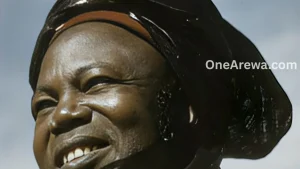
In Conclusion
Alhaji Sir Ahmadu Bello was a Nigerian statesman, traditional chieftain, and modern Nigeria’s founding father.
As Sardauna of Sokoto and first Premier of Northern Nigeria, he was instrumental in Nigeria’s independence and nation-building.
He was born in Sokoto, descended from the Sokoto Caliphate, and received a well-rounded education in both Islamic and Western systems.
After studying governance in England, he entered politics, advocating for federalism and northern interests.
In 1959, he led the Northern People’s Congress (NPC) to create a coalition government with the NCNC.
Bello aimed to develop Northern Nigeria by establishing significant institutions such as the NNDC, Bank of the North, and Ahmadu Bello University.
He emphasized unity, modernization, and education. Despite his assassination during the 1966 coup, his legacy lives on.
He was knighted by the British and received honorary degrees. His portrait is on Nigeria’s ₦200 note.

